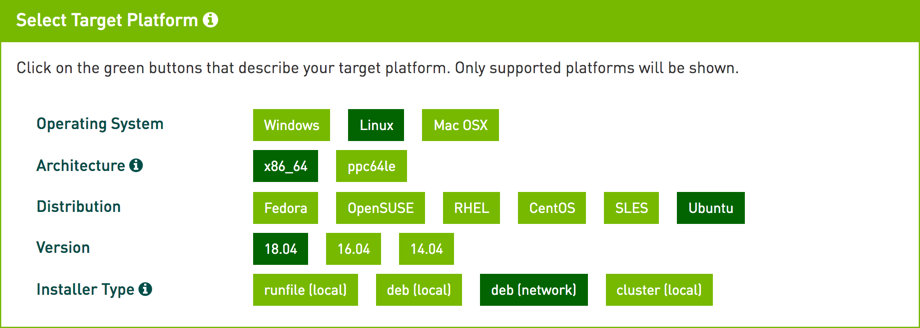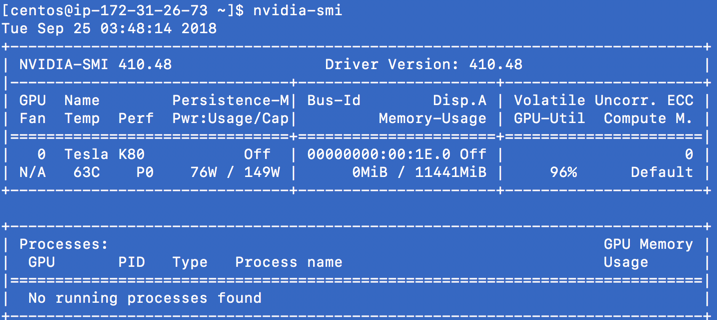Ubuntu OS GPU Installation With Tarball
This is an end-to-end recipe for installing OmniSci Open Source on an Ubuntu machine running with NVIDIA Kepler or Pascal series GPU cards.
Here is a quick video overview of the installation steps.
| Important | The order of these instructions is significant. To avoid problems, install each component in the order presented. |
Assumptions
- These instructions assume the following:
- You are installing on a “clean” Ubuntu host machine with only the operating system installed.
- Your OmniSci host only runs the daemons and services required to support OmniSci.
- Your OmniSci host is connected to the Internet.
Preparation
Prepare your Ubuntu machine by updating your system, creating the OmniSci user (named omnisci), installing kernel headers, and installing CUDA drivers.
Update and Reboot
- Update the entire system:
sudo apt update sudo apt upgrade
- Install a “headless” Java Runtime Environment:
sudo apt install default-jre-headless
- Verify that the
apt-transport-httpsutility is installed:sudo apt install apt-transport-https
- Reboot to activate the latest kernel:
sudo reboot
Create the OmniSci User
Create a group called omnisci and a user named
omnisci, who will be the owner of the OmniSci database.
You can create the group, user, and home directory using the
useradd command with the -U and -m
switches.
sudo useradd -U -m omnisci
Install CUDA Drivers
CUDA is a parallel computing platform and application programming interface (API) model. It uses a CUDA-enabled graphics processing unit (GPU) for general purpose processing. The CUDA platform provides direct access to the GPU virtual instruction set and parallel computation elements. For more information on CUDA unrelated to installing OmniSci, see http://www.nvidia.com/object/cuda_home_new.html.
Install Kernel Headers
- Install kernel headers with the following command:
sudo apt-get install linux-headers-$(uname -r)
- Reboot to ensure that the kernel is up to date:
sudo reboot
Install the Drivers
OmniSci requires only the CUDA drivers and not the entire CUDA package. To install the drivers:
- Go to https://developer.nvidia.com/cuda-downloads.
- Select the target platform by selecting the operating system (Linux), architecture (based on your environment), distribution (Ubuntu), version (based on your environment), and installer type (OmniSci recommends deb (network)).

- In Download Installer..., right-click the Download button and copy the link location of the Base Installer. Do not use the installation instructions on the CUDA site.

- Use one of the following methods to download the installer from the command line, using the download link you copied (in this example, https://developer.download.nvidia.com/compute/cuda/repos/ubuntu1804/x86_64/cuda-repo-ubuntu1804_10.0.130-1_amd64.deb):
curl:sudo curl -O https://developer.download.nvidia.com/compute/cuda/repos/ubuntu1804/x86_64/cuda-repo-ubuntu1804_10.0.130-1_amd64.deb
wget:sudo wget https://developer.download.nvidia.com/compute/cuda/repos/ubuntu1804/x86_64/cuda-repo-ubuntu1804_10.0.130-1_amd64.deb
Ifwgetis not installed in your environment, usesudo apt install wgetto install it.
- Install the CUDA drivers, using the filename you just downloaded (in this example, cuda-repo-ubuntu1804_10.0.130-1_amd64.deb):
sudo dpkg -i <file_name>
- If you do not have the public CUDA GPG key installed, run the installation command provided by NVIDIA in the terminal window; for example:
sudo apt-key adv --fetch-keys http://developer.download.nvidia.com/compute/cuda/repos/ubuntu1804/x86_64/7fa2af80.pub
- Update the local repository cache:
sudo apt update
- Install the CUDA Toolkit and GPU drivers:
sudo apt install cuda-drivers linux-image-extra-virtual
- Reboot your system to ensure that all changes are active:
sudo reboot
Checkpoint
Run nvidia-smi to verify that your drivers are installed
correctly and recognize the GPUs in your environment. Depending on your
environment, you should see something like this to verify that your NVIDIA GPUs
and drivers are present:
| Note | If you see an error like the following, the NVIDIA drivers are probably installed incorrectly:
NVIDIA-SMI has failed because it couldn't communicate with the NVIDIA driver. Make sure that the latest NVIDIA driver is installed and running.Review the Install CUDA Drivers section and correct any errors. |
Download the OmniSci Archive File
To download the OmniSci TAR file, in a web browser open the link https://releases.omnisci.com/os/tar/omnisci-os-latest-Linux-x86_64.tar.gz .
You can use curl to download the OmniSci TAR file. The location and
file name are up to you. Placing it in the ~/Downloads directory works
with the instructions below.
sudo curl https://releases.omnisci.com/os/tar/omnisci-os-latest-Linux-x86_64.tar.gz --output ~/Downloads/omnisci-os-latest-Linux-x86_64.tar.gz
You can use wget to download the OmniSci TAR file. Storing it
in the ~/Downloads directory works with the instructions below. For example:
$ cd ~/Downloads $ sudo /usr/local/bin/wget https://releases.omnisci.com/os/tar/omnisci-os-latest-Linux-x86_64.tar.gz
